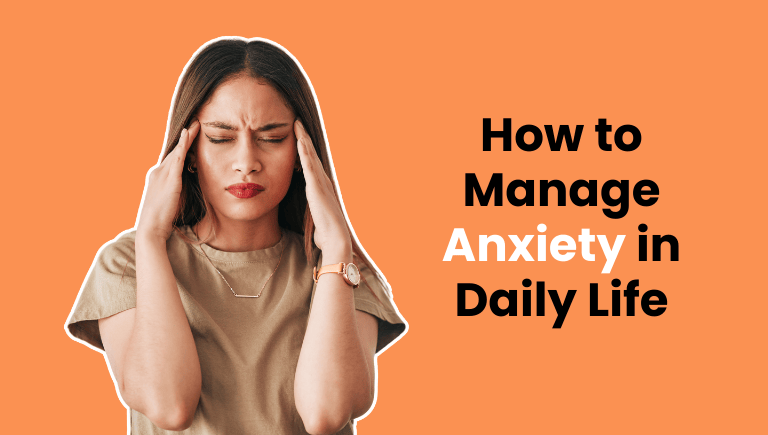Most people feel nervous or anxious at times. They may be tense before a speech, anxious about money, or worried that someone is sick.
Avoiding anxiety triggers can make you feel better in the short term, but it can increase your symptoms. It’s important to face your fears and learn skills like helpful self-talk and relaxation.
Breathing Exercises
Counting your breaths can help calm anxiety. Begin each day with a deep, measured breathing exercise by lying on your bed and closing your eyes. Breathe in for a count of four, filling your lungs, and then breathe out for six, exhaling slowly. Repeat this exercise throughout the day as needed.

The type of situations that trigger anxiety can vary from person to person, and they can be difficult to predict. However, some common triggers include:
- Anxiety symptoms may feel short-lived or pass once whatever is causing them is over, but they can also last for longer periods and interfere with daily life. It is important to seek professional help if anxiety symptoms persist and are disruptive to your quality of life.
- A mental health professional can provide a diagnosis and treatment plan that will improve your quality of life. Medication can also be an effective way to manage anxiety symptoms, especially when they are severe and persistent. Make sure to take your medications as directed by your provider. A healthy diet that includes vegetables, fruits, and whole grains can also reduce anxiety symptoms.
Yoga
While feeling anxious is a normal part of life, it can be overwhelming. Anxiety can be triggered by different situations, and symptoms can vary from person to person. Getting help from a mental health professional is the best way to manage anxiety and learn healthy coping strategies to prevent it from recurring.
Practicing mindfulness techniques can help people to become more aware of their surroundings and thoughts. Taking time for meditation and deep breathing can ease anxious feelings. Practicing gratitude and staying positive can also shift the focus away from negative fears and worries.
Regular physical activity, such as walking or running, helps reduce stress levels and improve sleep quality. It is important to make exercise a routine and try to be active most days of the week.
Changing diet can also make a difference. A diet rich in vegetables, fruits, and whole grains is associated with lower anxiety. Avoiding substances such as tobacco, caffeine, and alcohol can also improve anxiety. Talk to a doctor or pharmacist about medications that may be used to treat severe anxiety symptoms.
Meditation
It’s common to feel nervous or on edge before a big event, such as an interview, a trip, or a new relationship. But when these feelings start to interfere with daily life or cause unhelpful physical symptoms, it’s time to seek help.
Meditation is a great way to refocus the mind and body to calm anxiety-provoking thoughts. During meditation, people can practice breathing exercises that slow the heart rate, or they can focus on grounding practices like the 333 rule:
- Look around you and name three things you see, listen to three sounds, and touch or move three parts of your body.
- Sometimes bringing awareness to anxiety may amplify the feeling, but that is okay. Practicing curiosity about what you’re experiencing and then letting it go helps to normalize these feelings. You can also try using calming aromatherapy, such as burning a candle inhaling the scent of peppermint, and exploring your sense of taste with sips of warm tea or chewing on a gum piece. You can also find many different apps that offer guided or silent meditation.
Relaxation Music
In a world filled with pings, dings, apps, tags, and appointments, sometimes the best way to calm an anxious mind is by turning off the electronics and tuning in to some soothing tunes. Music can soothe the mind and body, and even boost immune function.
Music has a proven stress-reduction effect, and it may also help people to focus during challenging tasks. A recent study found that when adults listened to their preferred music while performing a low-demanding sustained-attention task, they did better than those who listened to neutral or silence.
Listening to relaxing music can activate the parasympathetic nervous system, which is responsible for relaxation. According to research published in the Journal of Advanced Nursing, listening to relaxing music reduces anxiety in adult women before and during surgery.
Relaxing music can also bring people together and create a positive environment for emotional expression and healing. Many group meditation and yoga sessions incorporate music to promote a peaceful atmosphere and enhance the practice. Music has been known to reduce social barriers, and it can be a great way for people from different backgrounds and cultures to connect.
Exercise
While anxiety can feel paralyzing, there are many things you can do to manage it. If you’re feeling anxious regularly, or your symptoms are severe, consult with a mental health professional. Identifying your triggers, physical signs, and unhealthy coping mechanisms can help you learn to deal with anxiety more effectively.
Try incorporating exercise into your daily routine. It can be as simple as taking a brisk walk, or doing some light stretches. You can also try yoga, mindfulness techniques, or meditation. Deep breathing exercises can help calm the mind and body, as well as reduce muscle tension associated with anxiety.
Keep a diary of your daily life to find out what situations and actions increase or decrease your anxiety levels. This can help you and your mental health provider identify what triggers your anxiety. You can then practice strategies to prevent or overcome these situations. Remember that your anxiety should not be a part of your identity, and it is possible to develop long-term strategies through behavioral therapy or medication.
